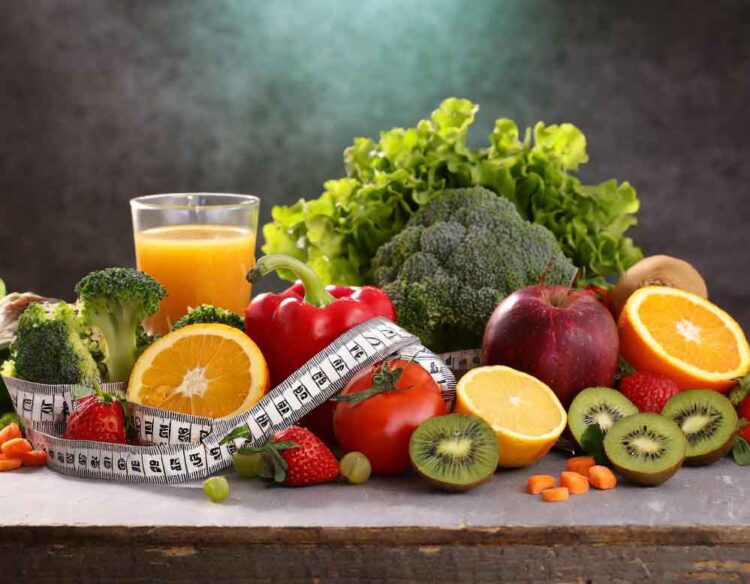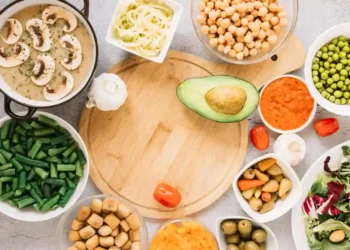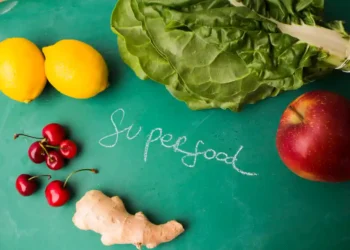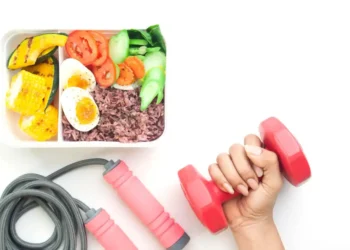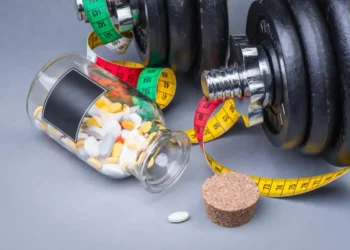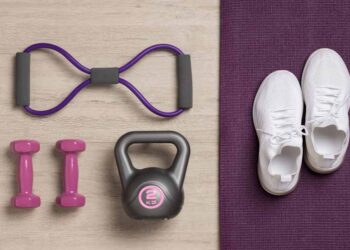Did you know how important what you eat is for growing or healing muscles? If you’re into sports, lifting, or a lot more, your food choices matter. Eating the right stuff after exercise helps your muscles get better and feel less sore. This supports how your body heals after a workout.
So, what are the top foods for helping muscles recover and grow? Let’s find out what can really boost your progress.
Key Takeaways:
- Consuming adequate calories and protein is essential for muscle repair and growth.
- Complete proteins found in animal foods and plant-based sources are important for building and repairing muscle.
- Protein snacks throughout the day and whey protein after a workout can enhance muscle recovery.
- Carbohydrates replenish energy stores and promote muscle recovery when paired with protein.
- Hydration is crucial for replenishing fluids lost during exercise and supporting muscle recovery.
The Benefits of Protein for Muscle Recovery
Protein is vital for rebuilding muscles after workouts. It helps repair and grow muscle tissue. Consuming enough protein post-workout lowers soreness and boosts muscle development.
Adding protein-rich foods to your meals aids recovery. Choices like chicken, turkey, fish, and dairy are great. For vegans and vegetarians, legumes, tofu, and tempeh provide essential protein.
Remember, protein should be part of a balanced diet. This includes carbs and fats. A balanced diet aids in muscle recovery. Make meals with various proteins to enhance your healing process.
“Protein is a crucial component of a muscle recovery diet.”
The Role of Protein in Muscle Recovery
| Benefits of Protein | Best Food Sources | Recommended Intake |
|---|---|---|
| Supports muscle repair | Lean meats (chicken, turkey, beef), fish, dairy products | Around 30 grams per meal |
| Reduces muscle soreness | Plant-based proteins (legumes, beans, tofu, tempeh) | Protein snacks throughout the day |
| Promotes overall muscle growth |
Protein has many muscle recovery benefits, as seen in the table. It aids muscle repair, lowers soreness, and helps with growth. Eating protein-rich meals fast-tracks your recovery by providing vital nutrients.
Always check with a professional to set your protein goals. A balanced diet is crucial. It boosts your muscle recovery and helps you achieve your fitness goals.
The Power of Carbohydrates for Muscle Recovery
Carbohydrates are key for muscle recovery. They give the energy needed to fill up glycogen stores. Also, they help fix and grow muscles after a hard workout.
It’s best to eat complex carbohydrates for recovery. Think whole grains, fruits, and veggies. These foods release energy slowly. They keep your blood sugar steady. Plus, they provide vitamins, minerals, and fiber. These help your body heal after working out.
Pairing carbohydrates with protein
Don’t forget to mix carbs with protein for better recovery. Eating them together after you exercise is a smart move.
“Carbs and protein in a post-workout meal can refill glycogen stores,” says Sarah Thompson.
Carbs and protein really team up to help your muscles. Carbs give them the energy to repair. Proteins give them the building blocks to grow again.
The Glycemic Index and Muscle Recovery
The type of carbs you choose matters, too. Look at their glycemic index (GI). This tells you how fast they raise blood sugar. High GI foods do it quickly, while low GI foods do it slowly.
Table: Examples of Low and High GI Foods
| Low GI Foods | High GI Foods |
|---|---|
| Apples | White bread |
| Sweet potatoes | White rice |
| Lentils | Pineapple |
| Oatmeal | Potatoes (mashed) |
To feed your muscles right, mix low and high GI carbs. This gives you quick energy and keeps it coming. For example, pairing pineapple with sweet potatoes works great for recovery.
Eating carbs after you work out is vital for muscle health. Choose complex carbs and look at the GI. Also, make sure to add protein. This way, you support muscle recovery and growth.
The Importance of Hydration for Muscle Recovery
Staying hydrated is key for muscle recovery and doing well in sports. Your body loses water when you sweat. So, it’s vital to drink water before, during, and after you exercise. This helps your muscles recover.
It’s not just water that’s important. Electrolytes like sodium and potassium are also needed. They help your muscles work properly and stop cramps. Foods like watermelon and cucumber are great after a workout. They help keep you hydrated and help your muscles recover.
Electrolyte-Rich Foods for Hydration
Some foods are full of electrolytes. They can help with staying hydrated and helping your muscles recover:
| Food | Electrolyte Content |
|---|---|
| Watermelon | High in water content and contains potassium |
| Cucumber | High in water content and contains potassium and magnesium |
| Coconut Water | Natural source of electrolytes, including potassium and sodium |
| Sports Drinks | Designed specifically to replenish electrolytes lost during exercise |
Eating these foods after working out can keep you hydrated. It supports your muscle recovery. Always pay attention to when you’re thirsty. And remember to drink lots of water each day.
Hydration is essential for muscle recovery and performance. Remember to drink plenty of water and eat foods rich in electrolytes. By focusing on staying hydrated, you help your body recover and improve your muscles.
The Role of Antioxidants in Muscle Recovery
Antioxidants are key in helping muscles recover. They fight off oxidative stress and inflammation from hard workouts. Adding antioxidant-rich foods to what you eat after working out can cut down on muscle pain.
Fruits and veggies are top sources of these healing antioxidants. Think of colorful fruits and dark greens. They’re packed with vitamins, minerals, and phytochemicals, perfect for powering up recovery.
Here are some antioxidant-rich foods you should eat after working out:
- Blueberries
- Strawberries
- Raspberries
- Blackberries
- Cherries
- Kale
- Spinach
- Broccoli
- Red bell peppers
- Oranges
These foods don’t just fight off bad stuff. They also help your muscles heal and grow. Mixing them into your meals helps your body fix and renew muscle quicker.
When you can, go for organic. It lessens pesticide risks and boosts your food’s nutrients.
Antioxidant Smoothie Recipe
Start your recovery with a tasty, antioxidant-filled smoothie:
“Berry Blast Smoothie”
Serves: 2
| Ingredients | Instructions |
|---|---|
|
|
This smoothie blends berries, greens, and protein for your muscles. It’s great for a snack after you work out, or even replace a meal. It helps your body heal and grow your muscles.
The Benefits of Omega-3 Fatty Acids for Muscle Recovery
Adding omega-3 fatty acids to your diet helps your muscles recover after working out. They are great at fighting inflammation. This means they help your muscles heal and reduce swelling.
Fish like salmon, trout, and sardines are full of omega-3s. They are perfect for fighting muscle soreness. So, eating these fish after you exercise can make you feel better faster.
Not everyone eats fish, though. If you’re on a plant-based diet, you can get omega-3s from flaxseeds, chia seeds, and walnuts. These foods also help your muscles recover and get stronger.
Omega-3 fatty acids are key to getting over your workout. Including them in your meals boosts your recovery. So, they’re a big help in reaching your fitness goals.
Example of fatty fish varieties rich in omega-3 fatty acids:
| Fatty Fish | Omega-3 Fatty Acid Content (per 3 ounces) |
|---|---|
| Salmon | 1.5-2 grams |
| Trout | 0.6-0.9 grams |
| Sardines | 1.1-1.5 grams |
Other plant-based sources of omega-3 fatty acids:
- Flaxseeds
- Chia seeds
- Walnuts
Adding these omega-3 rich foods to your diet can really boost your recovery and muscle growth.
The Importance of Rest for Muscle Recovery
Rest is key for your muscles to heal. Sleeping enough lets your body fix and make new muscle. It also fills up your energy again. Rest lowers the chance of getting hurt from too much training.
Your eating habits also matter. After working out, pick meals that help you relax and sleep. Foods high in magnesium, like dark chocolate and nuts, calm you down. This makes falling asleep easier.
Foods with tryptophan, found in turkey and dairy, help too. Tryptophan changes into serotonin, which makes you sleepy and calm.
The Benefits of Rest and Sleep for Muscle Recovery
Rest and sleep help the body fix muscles and top up its energy. They also stop too much training and injuries.
Good rest and sleep are champs for muscle fixing. When asleep, the body makes growth hormone. This hormone is vital for building and repairing muscles.
Not sleeping enough messes with this hormone and slows down muscle mending.
Rest and sleep lessen swelling and stress in the body after hard workouts. A well-rested body can manage these better and fix muscles quicker.
Making good sleep habits is a must. A calming bedtime routine, no screens before sleep, and a cool, dark room are great for sleep. This boosts how well you recover.
The Role of Nutrition in Promoting Restful Sleep
Eating magnesium and tryptophan after working out helps you sleep and relax.
Magnesium in foods like dark chocolate calms muscles. It’s needed to make GABA, a signal that tells your brain to relax and sleep.
Tryptophan, found in turkey and dairy, is good for sleep too. It starts the making of serotonin and melatonin, helping you sleep and rest.
Eating these foods after exercising helps your muscles recover better. It’s good for your overall healing after working out.
Conclusion
Proper nutrition is key for muscle recovery and general healing after exercising. A balanced diet is vital, with enough protein, carbs, fats, and vital nutrients. This combo supports muscle fix, lessens soreness, and boosts growth.
Eat foods high in protein, carbs, antioxidants, and omega-3s after exercising. These choices aid quick muscle recovery and help you reach your fitness targets.
But, eating right isn’t the only thing for muscle recovery. Staying hydrated, resting enough, and sleeping well are as critical. These steps boost the positives of eating well and help your muscles recover better.
By focusing on nutrition and lifestyle, you’ll improve your muscle recovery. It’s not just about the workout. It’s also about your diet and post-exercise care. Feed your body right for muscle recovery, stick to a wise post-exercise diet, and see your muscles repair and grow better.

